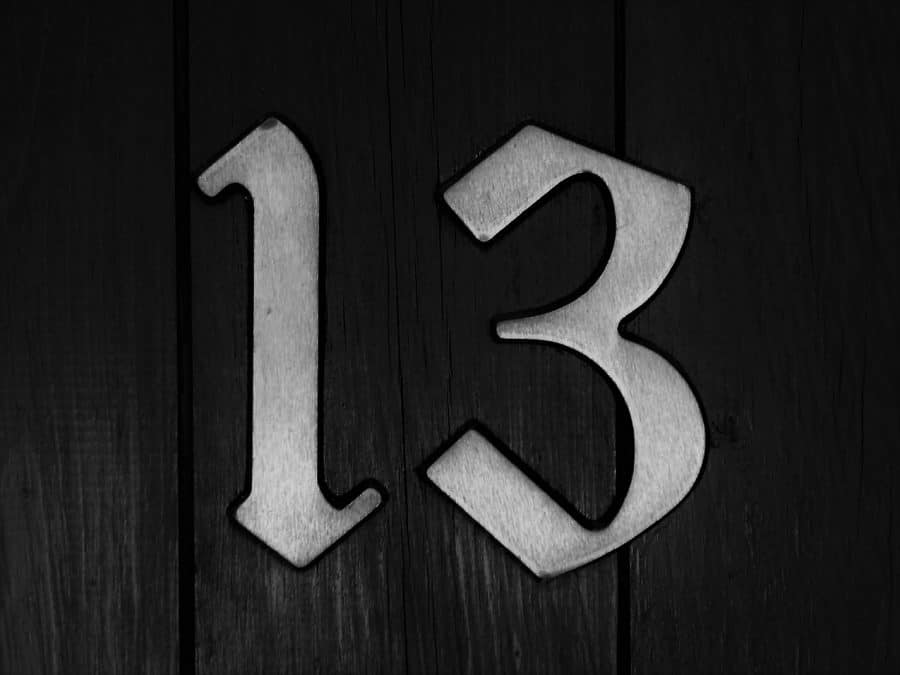While the number 13 is often associated with bad luck, it holds a special meaning for tattoo enthusiasts. In the world of tattoos, the number 13 is seen as an antidote to conventional misfortune and a symbol of solidarity among ink lovers. This article explores the mystery, history, and enduring popularity of number 13 tattoos.
Table of Contents
ToggleWhat Does the Number 13 Tattoo Mean?
According to Trent Aitken-Smith’s Tattoo Dictionary, having a number 13 tattooed on you is believed to ward off bad luck. It is thought that if misfortune comes your way and sees the number 13 inked on your skin, it will assume that you have already experienced enough bad luck and pass you by. Another belief tied to superstition is that a tattoo of a symbol traditionally associated with bad luck cancels out the negative connotations, effectively reversing its meaning. Many prison inmates, gang members, and outlaw bikers from Southern California proudly wear the number 13 as a badge of alienation from mainstream society.
Sailor Superstition
Number 13 tattoos have a deep-rooted history in traditional Western tattooing. In the old school era of tattooing, when sailors and navy men were the primary customers, flash tattoo sheets featuring the number 13 were quite common. Having a 13 tattoo meant defying the conventional belief that the number 13 and Friday the 13th are unlucky. Various historical events, such as Judas Iscariot being the 13th disciple of Jesus, the disbanding of the Knights Templar on Friday the 13th in 1307, and the Mayan belief in an ominous 13th month, have contributed to the superstition surrounding the number 13. This number continues to hold significance in contemporary notions of luck, with many passenger aircraft omitting the row number 13 and tall buildings avoiding a 13th floor.
Gangs, Prisons, Bikers, and Number 13 Tattoos
The number 13 has political relevance in graffiti, street gangs, the US prison system, and even gangs on an international scale. In California prisons, inmates were divided into two rival groups in 1968: Norteno (northerners) and Sureno (southerners), based on their hometown locations. The Sureno gang, mainly active in Southern California, Arizona, and New Mexico, uses the number 13 as a symbol of their allegiance to the Mexican Mafia prison gang. Their tattoos and graffiti feature various interpretations of the number 13, including the number itself, Roman numerals, or script versions. On the other hand, the Norteno gang, connected to the Nuestra Familia mafia prison organization, is stronger in the northern part of Los Angeles, the Bay Area, and California’s prison system. They use the number 14 in their gang tattoos. Outlaw motorcycle gangs also incorporate the number 13 into their patches, signifying links to the mother chapter or involvement in drug-related activities.
Number 13 Tattoos and the Friday the 13th Special
Some tattoo artists offer special deals on Friday the 13th, commonly known as the “Friday the 13th special.” These deals often involve small tattoo flash sheets or number 13 tattoos at discounted prices, sometimes as low as $13. While many people take advantage of these promotions, it is essential to remember that tipping is customary when getting tattooed. Despite the low price, it’s recommended to add a little extra as a tip to show appreciation for the artist’s work. Additionally, these events tend to attract large crowds, so be prepared for the possibility of long lines.
Oliver Peck’s 13: Party Starter and World Record Holder
Oliver Peck, a former judge on Ink Master, played a significant role in popularizing the tradition of number 13 tattoos. In 1995, he organized a 24-hour Friday the 13th party at his Dallas parlor, where he tattooed special flash designs on anyone who came in. This event marked the beginning of a new tattoo tradition. Peck even held a Guinness World Record for tattooing the number 13. In 2008, at his Elm Street Tattoo Shop in Texas, Peck completed 415 flash sheet tattoos of the number 13 within 24 hours. Although his record was later surpassed, his contribution to the number 13 tattoo culture remains noteworthy.
Frequently Asked Questions
What Does a 13 Tattoo Symbolize?
A 13 tattoo is a symbol of defiance against conventional bad luck and serves as an identifier for tattoo enthusiasts. It is associated with superstitious sailors, prison gangs, outlaws, and the concept of being an outsider.
Is the Number 13 Considered Lucky or Unlucky?
In Western culture, the number 13 is generally considered unlucky due to its association with the traitor Judas and the demise of the Knights Templar. However, within the tattoo community, the number 13 is embraced as a lucky symbol that deconstructs traditional notions of bad luck.
Is the Number 13 a Gang Tattoo?
The number 13 is used as a tattoo identifier in some gangs. The Sureno gang, primarily based in Southern California, and the notorious MS-13 gang, founded by Salvadoran immigrants in Los Angeles, are prominent examples.
In conclusion, number 13 tattoos hold a captivating allure for those seeking to challenge conventional beliefs and embrace a sense of camaraderie with like-minded enthusiasts. Whether rooted in superstition, gang affiliations, or personal expression, the number 13 continues to inspire and captivate the tattoo community.
Visit TKTX Numbing Cream Store for the best numbing cream products to enhance your tattoo experience!









